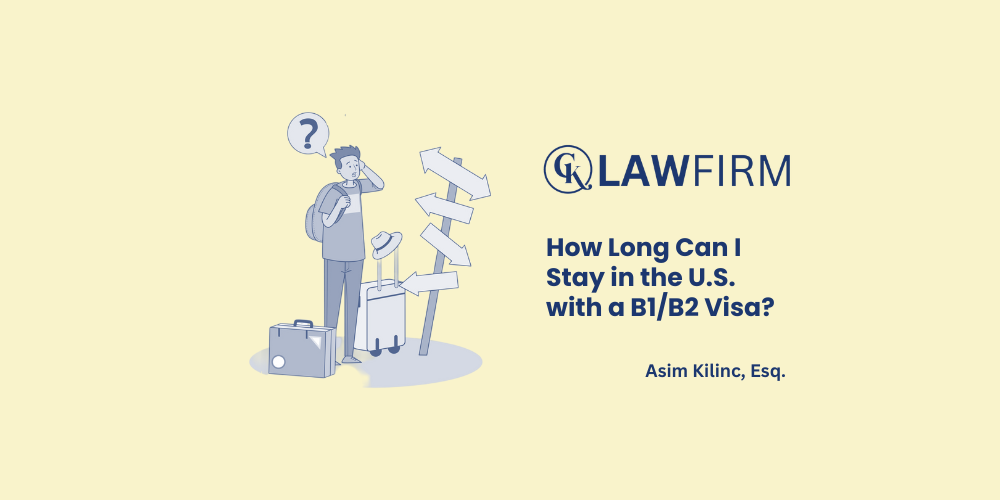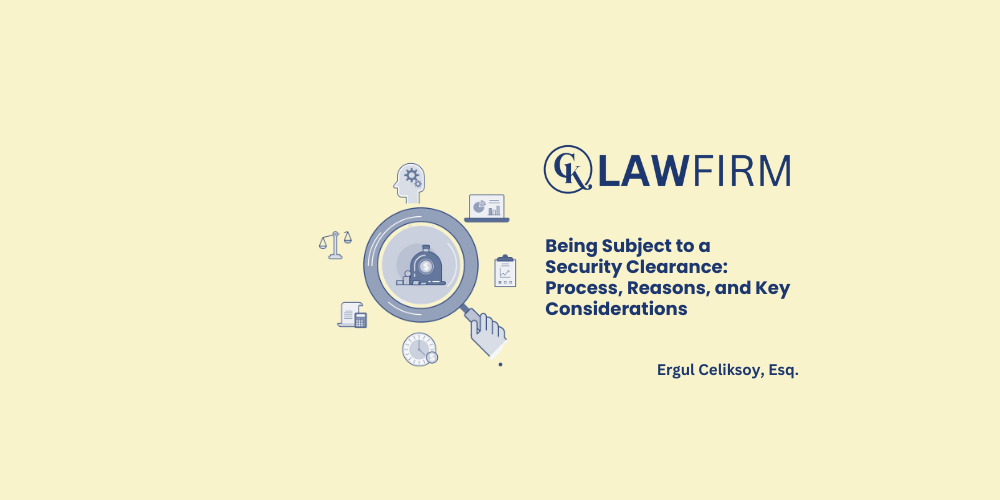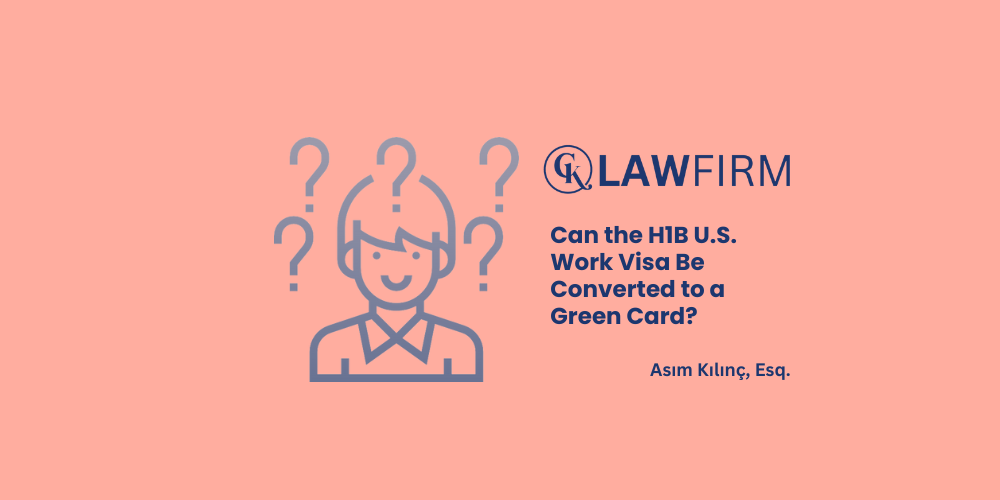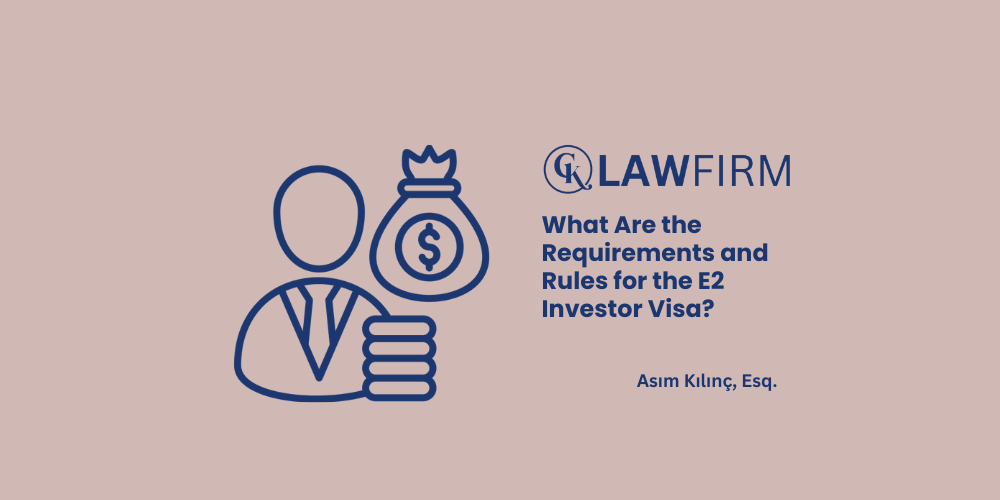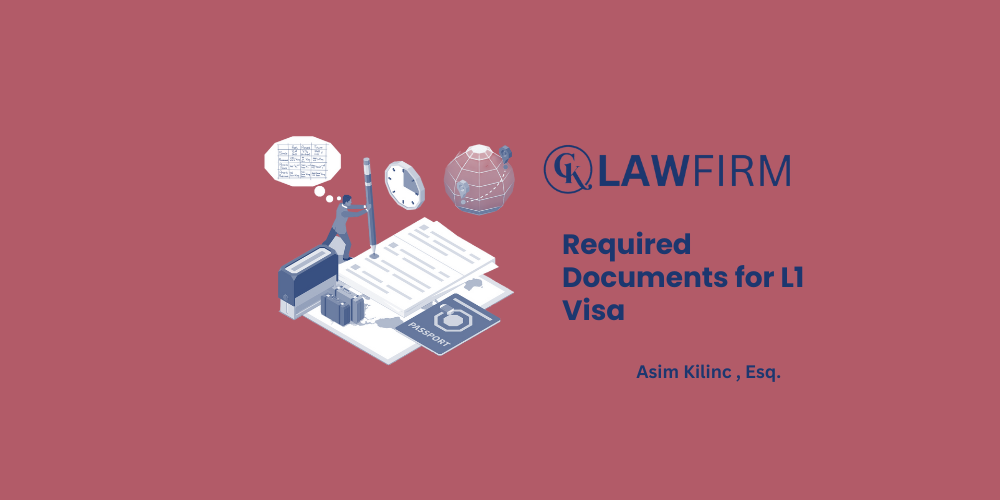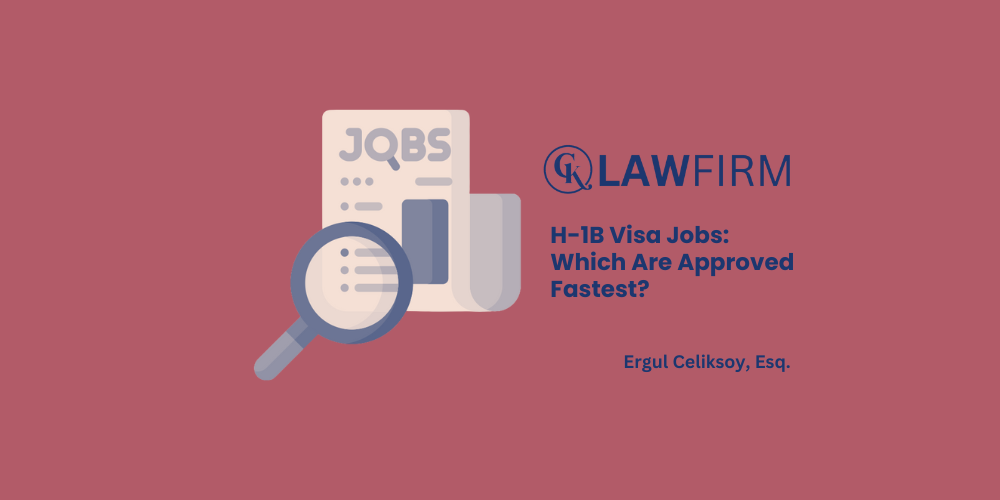Schedule an Appointment with Our Attorneys Now
By Asim Kilinc, Immigration Attorney at CK Law Firm
The B1/B2 visa is a combined visitor visa granted for short-term visits to the United States. The B1 visa is issued for business purposes, while the B2 visa is for personal reasons such as tourism, medical treatment, social events, and visiting relatives. The B1/B2 visa, one of the most commonly used visa types for short-term travel to the U.S., has specific rules regarding its validity and duration of stay. By reading this article, you will find answers to the following questions:
- What is a B1/B2 Visa?
- B1/B2 Visa Validity Period
- Duration of Stay in the U.S.
- Extending the Duration of Stay
- Consequences of Overstaying
- Tips for Traveling to the U.S. with a B1/B2 Visa
If you have any additional questions about the B1/B2 visa type, please don’t hesitate to contact me through the comments section below this article, via LinkedIn, or through our CK Law Firm Immigration Law Firm’s website, of which I am a founding partner.
What is a B1/B2 Visa?
The B1/B2 visa is a visa granted to individuals who wish to temporarily visit the United States for tourism, business, or medical reasons. This visa type is suitable for individuals who do not intend to immigrate to the U.S. and only wish to stay for a specific period. B1/B2 visa holders typically travel to the U.S. for reasons such as attending conferences, conducting business meetings, taking vacations, or visiting family members.
B1/B2 Visa Validity Period
The validity period of a B1/B2 visa determines how long it will remain valid from the date of issuance. This period represents your right to enter the U.S., but it does not indicate how long you can stay in the country.
How is the Validity Period Determined?
The validity period of the visa is determined based on the applicant’s nationality, international agreements with the U.S., and the assessment of the U.S. Consulate. For example, in applications from Turkey, B1/B2 visas are generally granted with a validity period of up to 10 years. However, this period may be shorter in some countries.
Single Entry and Multiple Entry Visas
The B1/B2 visa is usually issued as a multiple-entry visa, allowing you to enter the U.S. multiple times within the validity period. However, you cannot enter the U.S. after the expiration date indicated on your visa. You will need to apply for a new visa before your current one expires.
Duration of Stay in the U.S.
After entering the U.S. with a B1/B2 visa, a U.S. Customs and Border Protection (CBP) officer will determine how long you can stay in the country. This period is typically up to 6 months and is documented with a form I-94.
I-94 Form and Duration of Stay:
The I-94 form is a document provided to you upon entry into the U.S. that indicates your authorized duration of stay. This document is the most important in determining how long you can legally remain in the U.S. Your duration of stay is independent of your visa’s validity period and is reassessed with each entry.
Short-Term Stays:
Sometimes, CBP officers may assign a shorter duration of stay. For example, if you are visiting the U.S. for just a week for a business meeting, your stay may be limited to 1 month. This decision depends on the officer’s assessment of the purpose and plans for your trip.
Extending the Duration of Stay
If you need to extend your stay in the U.S., you must apply to the U.S. Citizenship and Immigration Services (USCIS). This application must be made before your current stay expires. When applying for an extension, you must have valid reasons to continue staying in the U.S. and provide supporting documentation.
How to Apply for an Extension?
To apply for an extension, you must complete form I-539 and submit it to USCIS. In this form, you must explain why you wish to extend your stay and include the necessary documents. For example, if you are extending your stay for medical treatment, you must submit medical reports and a treatment plan.
If the Extension Request is Denied:
If your extension request is denied, you must leave the U.S. within the specified time frame. Otherwise, you will be staying in the country illegally, which can negatively impact your future visa applications.
Consequences of Overstaying
Overstaying your authorized duration in the U.S. can have serious consequences. These may include the denial of future visa applications, the cancellation of your current visa, and even a ban on entering the U.S.
- Visa Violation:
Overstaying your authorized duration is considered a visa violation under U.S. Immigration and Nationality Law. This may lead to the loss of your right to re-enter the U.S. and the cancellation of your current visa. - 3-Year and 10-Year Bans:
If you remain in the U.S. unlawfully for more than 180 days, you may be banned from entering the U.S. for 3 years after leaving the country. If the overstay exceeds 1 year, the ban increases to 10 years. These bans can make it very difficult to obtain a U.S. visa in the future. - Deportation:
If it is determined that you have overstayed, you may face deportation. Deportation is carried out by U.S. Immigration and Customs Enforcement (ICE) and can be both financially and emotionally challenging.
Tips for Traveling to the U.S. with a B1/B2 Visa
If you plan to travel to the U.S. with a B1/B2 visa, you can ensure a smooth journey by following these tips:
- Prepare Your Documents at the Entry Point:
When entering the U.S., have documents ready that prove the purpose of your trip and the duration of your stay. These documents may include flight tickets, hotel reservations, business invitations, or medical reports. - Pay Attention to the Duration of Stay:
Always check the duration of stay indicated on your I-94 form and make sure not to overstay. If you need to extend your stay, make sure to submit your application to USCIS on time. - Keep Your Record Clean for Future Travel:
Be mindful of not violating your stay duration, as this can cause problems for future trips to the U.S. When you wish to re-enter the U.S., your previous travel records will be taken into consideration.
Conclusion
The B1/B2 visa is a flexible and widely used visa type for those who wish to temporarily visit the United States. However, it is crucial to be careful about how long you can stay in the U.S. with this visa and how that duration can be extended. Given the complexity of the process and the legal requirements, seeking support from an immigration attorney can be beneficial. Don’t forget that you can reach me through the CK Law Firm Immigration Law Firm’s website, via info@cklawfirm.org email address, or directly on LinkedIn!
Who is Attorney Asım Kılınç?
Attorney Asım Kılınç is the co-founder of CK Law Firm and is recognized for his expertise in immigration law and U.S. asylum applications. Kılınç completed his Master’s degree at Southern Methodist University Dedman School of Law and is a member of the Missouri Bar Association, with a focus on U.S. immigration law.
Attorney Kılınç’s extensive knowledge and experience in immigration law have significantly contributed to CK Law Firm’s success in this field. He has actively participated in the preparation of over 1,000 cases, demonstrating his expertise in this area. By providing comprehensive and professional legal support to his clients, he helps them adapt to their new lives in the U.S.
Attorney Kılınç is also well-versed in U.S. asylum applications. He meticulously guides his clients through the process and ensures they receive the best legal advice. He provides top-quality service to clients in matters of citizenship, Green Card, work permits, and other immigration processes, supporting them from start to finish on their journey to U.S. citizenship.
Attorney Asım Kılınç, who solidifies CK Law Firm’s leadership in immigration law and U.S. asylum applications, offers reliable and effective legal consultancy services to clients, assisting them in building a new life in the U.S.
By Ergul Celiksoy, Immigration Attorney at CK Law Firm
A security clearance is a process conducted to review the background of individuals applying for immigration or a visa to the United States. The U.S. government conducts this investigation to ensure national security and prevent the entry of individuals who may have the potential to engage in illegal activities.
- What Is a U.S. Security Clearance and Why Is It Conducted?
- Which Applications Are Subject to Security Clearance?
- What Does It Mean to Be Subject to a Security Clearance?
- Why Are Applicants Subject to a Security Clearance?
- What Happens During the Security Clearance Process?
- What Should You Do If You Are Subject to a Security Clearance?
- How Long Does It Take for the Security Clearance to Be Concluded?
- What Are the Outcomes of a Security Clearance?
If you have any further questions about this topic, don’t hesitate to leave a comment below, message me directly on LinkedIn, or reach out to me via the CK Law Firm Immigration Law Office website, where I am a co-founder!i
What Is a U.S. Security Clearance and Why Is It Conducted?
A U.S. security clearance is a process where the backgrounds of applicants are carefully scrutinized before they enter the United States. The purpose of this clearance is to protect U.S. national security and ensure that individuals entering the country do not pose a security risk. During the immigration process, the background of applicants is reviewed to assess any potential links to terrorism, criminal history, or involvement in illegal activities. This is part of the U.S. policy to safeguard both international agreements and domestic security.
Which Applications Are Subject to Security Clearance?
Security clearance may apply to those seeking to enter the U.S. on various visas or through immigration status. The main categories include:
- Visa Applications: Everyone applying for non-immigrant visas (such as tourist, student, or work visas) or immigrant visas (such as Green Card applications) is subject to a security clearance.
- Green Card Applications: Those applying for permanent residency (Green Card) undergo a thorough security clearance process.
- Citizenship Applications: The backgrounds of those applying for U.S. citizenship are thoroughly reviewed to detect any crimes committed during their stay in the U.S. or any activities that might pose a threat to the country’s security.
- Work Visas: Applicants for employer-sponsored visas such as H-1B, L-1, and O-1 are subject to security clearance. Their professional background and activities in the U.S. are also reviewed.
- Refugee and Asylum Applications: Security checks are conducted meticulously for those seeking asylum or refugee status in the U.S., ensuring the accuracy of the information provided by the applicant within the framework of intergovernmental security agreements.
What Does It Mean to Be Subject to a Security Clearance?
Being subject to a security clearance means that further investigation is required regarding an individual’s background during their visa, Green Card, or citizenship application. If there are suspicious activities, criminal records, or violations of immigration rules in the applicant’s history, the approval process may be delayed. In this case, a thorough investigation will be conducted to assess whether the application poses a security risk.
Why Are Applicants Subject to a Security Clearance?
Several factors can trigger a security clearance for an applicant, including:
- Criminal Records: Past crimes, especially violent offenses, fraud, or drug trafficking, can trigger a security clearance.
- Terrorism Links: Any connection to terrorist organizations can raise suspicion and lead to a security clearance.
- Immigration Violations: Individuals who have previously overstayed in the U.S., violated visa conditions, or used false documents in their applications may face security clearance.
- Military or Security Work: Applicants who have worked in the military or security sectors in their home country may require additional investigation, as the U.S. government may want to review their ties to other governments.
- Political or Religious Views: In some cases, an individual’s political or religious views may cause the government to examine the application more closely, especially if there are suspicions of involvement with radical or extremist movements.
What Happens During the Security Clearance Process?
When an application is flagged for security clearance, the processing time may be extended. Several federal agencies (such as the FBI, CIA, and DHS) conduct a comprehensive review of the applicant’s background. The process involves the following steps:
- Database Checks: The U.S. government scans the applicant’s name in various national and international databases. These checks may reveal criminal records, travel history, financial transactions, and connections to terrorist organizations.
- Interview and Additional Documents Request: In some cases, the applicant may be asked to provide additional documents or attend an in-person interview at the U.S. consulate. The interview is designed to clarify the applicant’s background and verify the information provided.
- In-Depth Investigations: If the applicant poses a security risk, a more comprehensive investigation may be launched, potentially extending the time for the application to be processed.
What Should You Do If You Are Subject to a Security Clearance?
Being subject to a security clearance is a common situation for applicants. Here are some important steps to take:
- Be Patient: The security clearance process can take time. Applicants should remain patient and regularly check the status of their applications.
- Submit All Documents Accurately: Providing all documents accurately and completely at the time of application can help speed up the process. It is crucial to avoid submitting false information or documents, as this can not only delay the process but also result in the rejection of the application.
- Provide Additional Information Quickly: If the U.S. government requests additional information, providing it quickly and accurately can help expedite the process. Applicants should submit the requested documents as soon as possible.
How Long Does It Take for the Security Clearance to Be Concluded?
The time it takes to conclude a security clearance varies depending on the applicant’s background, the documents submitted, and other factors. Typically, a security clearance can be completed within a few weeks to several months. However, if there are issues or suspicious circumstances in the applicant’s history, the process can be extended for months.
Common situations and average processing times include:
- Routine Applications: These are generally resolved within a few weeks to 2-3 months. These applications require no additional scrutiny, and the applicant’s background is clean.
- Additional Security Reviews: If the applicant has a criminal record, international travel history, or connections to U.S. security agencies, the review process can take 6 months or more. This is common for applications from countries considered high security risks.
- Refugee or Asylum Applications: Security clearance for these applications can take more than six months, depending on the applicant’s country and background. A thorough international review of the individual’s history is conducted.
What Are the Outcomes of a Security Clearance?
A security clearance can result in three possible outcomes:
- Approval: If the applicant is found to pose no threat, the application is approved, and a visa or Green Card is issued.
- Denial: If the applicant poses a security risk or has a criminal record, the application may be denied, preventing the individual from entering the U.S.
- Additional Review: In some cases, the applicant’s situation may require further investigation, which can prolong the application process.
Conclusion
Being subject to a security clearance is a common situation in U.S. immigration applications. Applicants should remain patient, provide accurate information, and seek assistance from an immigration attorney. At CK Law Firm, we provide the necessary legal support to applicants during the security clearance process. Seeking professional help is always the best approach to speeding up the process and ensuring a smooth application.
For professional support, detailed information, and consultation services, you can contact us via cklawfirm.org, info@cklawfirm.org, or connect with us on LinkedIn.
Who is Attorney Ergül Çeliksoy?
Attorney Dr. Ergül Çeliksoy is a founding partner of CK Law Firm and also serves as an Assistant Professor of Law at the University of Nottingham. With extensive experience in U.S. immigration law, Dr. Çeliksoy completed a Master’s degree in international law and human rights law at the University of Nottingham in 2017, followed by a Ph.D. at the same university. His Ph.D., completed in 2022 at the University of Nottingham School of Law, marked a significant milestone in his academic career. Dr. Çeliksoy has published extensively in leading academic journals and is internationally recognized for his expertise in modern slavery, criminal justice, and criminal law. As a member of the California Bar, Dr. Çeliksoy offers exceptional service to his clients, particularly in U.S. immigration law cases. His expertise and experience in immigration law significantly contribute to CK Law Firm’s work in this area.
Dr. Çeliksoy provides comprehensive and strategic solutions to his clients in immigration law cases, helping secure their legal status in the U.S. His work on human rights and immigration processes, particularly in modern slavery and criminal law, effectively addresses the complex legal issues immigrants face. Dr. Çeliksoy reinforces CK Law Firm’s leadership in immigration law by offering reliable and effective legal consulting services to his clients, helping them build new lives in the United States.
Asım Kılınç, Immigration Attorney, CK Law Firm
For individuals aiming to work and establish a long-term life in the United States, the H1B U.S. work visa is a critical step. However, many wonder if the H1B visa can eventually transition into a Green Card after securing a work opportunity. In this article, I will explore the process of converting an H1B visa into a Green Card, along with the following topics:
- Building a Career in the U.S. with an H1B Visa
- What is a Green Card?
- The Green Card Process
- Is it Possible to Obtain a Green Card with an H1B Visa?
- Tips for Transitioning from H1B Visa to Green Card
If you have questions beyond these topics, feel free to reach out through the comments section of this blog or via the CK Law Firm official website. For personalized inquiries or consultancy services, you can also connect with me directly on LinkedIn.
Building a Career in the U.S. with an H-1B Visa
The H-1B visa is a work visa designed for individuals seeking to work in specialized professions in the United States. It is commonly granted to professionals with expertise in fields such as technology, engineering, healthcare, and academia. Notable H-1B visa professions include software engineers, doctors, and university faculty members.
The H-1B visa process begins with sponsorship from a U.S. employer, granting professionals the right to work in the United States. However, it’s important to note that this visa is temporary. The answer to the question, “How long is an H1B visa valid?” is initially 3 years, with the option to extend it up to a total of 6 years. Furthermore, H1B visa holders have the opportunity to transition to a Green Card, securing permanent residency in the U.S.
What is a Green Card?
A Green Card is a document that grants individuals the right to live and work permanently in the United States. Officially known as “Permanent Resident Status”, it allows holders to reside and work in the U.S. without being tied to a temporary visa. Additionally, individuals with a Green Card can apply for U.S. citizenship after meeting certain requirements.
So, how can a Green Card be obtained? Here are the main pathways:
- Family-Based Green Card: A program designed for close family members of U.S. citizens.
- Employment-Based Green Card: The most common route for individuals with an H-1B visa.
- Green Card Lottery (Diversity Visa): An annual program offering random selection opportunities for individuals from eligible countries.
The Green Card Process
The Green Card process involves several stages and often includes a lengthy waiting period. For those transitioning from an H1B U.S. work visa to a Green Card, the journey typically begins with employer sponsorship. The employer must complete critical steps, such as obtaining PERM certification and filing Form I-140.
What is PERM Certification?
PERM Certification is a process where the employer demonstrates that there are no qualified U.S. citizens or permanent residents available to fill the position for which you are applying. It certifies that the employer has completed fair recruitment processes and shows the necessity of hiring you for the role.
What is Form I-140?
Form I-140 is a petition submitted to USCIS (U.S. Citizenship and Immigration Services) by the employer, affirming their support for your Green Card application and their intention to employ you. This form also verifies the employer’s financial capability and that the job requirements align with the position being offered.
These two steps are fundamental in the Green Card process and must be completed thoroughly. Providing accurate information and documentation at each stage is crucial to increasing the likelihood of approval for your application.
Green Card Fees
The costs associated with a Green Card application are a significant part of the process. Here are the main expenses that applicants may encounter:
- Filing Fees: These are fees required by USCIS to process the Green Card application and typically range between $1,200 and $1,500.
- Biometric Processing Fee: An additional fee of approximately $85 is required for collecting biometric information, such as fingerprints and photographs.
- Form I-485 Fee: Used for Adjustment of Status, this form is necessary for transitioning from a temporary status in the U.S. to permanent residency. The fee for this form is about $1,140 and must be paid for the application to be officially processed.
In employer-sponsored Green Card applications, some costs may be covered by the employer. However, the fees listed above are typically the applicant’s responsibility and are critical to the process. Paying these fees on time and in full ensures that the application proceeds without complications.
Green Card Application Dates
Green Card application dates are determined through the monthly Visa Bulletin published by the U.S. Citizenship and Immigration Services (USCIS). This bulletin provides detailed information on priority dates based on the applicant’s category and country of origin.
Applicants must carefully monitor the cut-off dates to ensure their applications can be processed. The Visa Bulletin helps you understand the current status of your application and allows you to regularly track your progress in the process.
While H1B visa applications typically begin in April each year, there is no fixed date for Green Card applications. Therefore, it is essential to regularly check for updates and announcements from USCIS.
Is it Possible to Obtain a Green Card with an H1B Visa?
H1B U.S. work visa holders can apply for a Green Card after working in the United States for a certain period. This process is typically initiated by the employer and is known as the Employment-Based Green Card (EB Green Card). The key stages of this process are as follows:
- PERM Certification: In this step, the employer must demonstrate that the position was first offered to U.S. citizens or lawful permanent residents but no suitable candidates were found.
- Form I-140: This form is submitted to USCIS (U.S. Citizenship and Immigration Services) by the employer to confirm the employee’s eligibility for a Green Card.
- Waiting Periods: Processing times may vary depending on the applicant’s occupation or quotas based on their country of origin.
H1B U.S. work visa holders can initiate the Green Card process by following these steps. Proper planning and seeking professional guidance are critical to ensuring the successful completion of this transition.
Tips for Transitioning from H-1B Visa to Green Card
After securing an H1B U.S. Work Visa and paying the necessary H1B visa fees, professionals working in the United States can transition to a Green Card to establish permanent residency. Here are some key tips for a successful transition:
- Plan Ahead: Start planning your Green Card journey early, ideally during the first few years of your H-1B visa. Early preparation can streamline the process.
- Seek Expert Assistance: The Green Card process can be complex. Don’t hesitate to seek professional legal guidance to navigate the steps effectively.
- Keep Your Documents Ready: Ensuring all required documents are prepared and submitted on time can help expedite the process.
- Understand Quotas and Wait Times: Certain professions or nationalities may face longer wait times due to quotas. Being aware of these factors can influence your application strategy.
If you have any questions, feel free to leave a comment below this blog or contact us through our website. For personalized inquiries or to benefit from my consultancy services, you can also connect with me on LinkedIn.
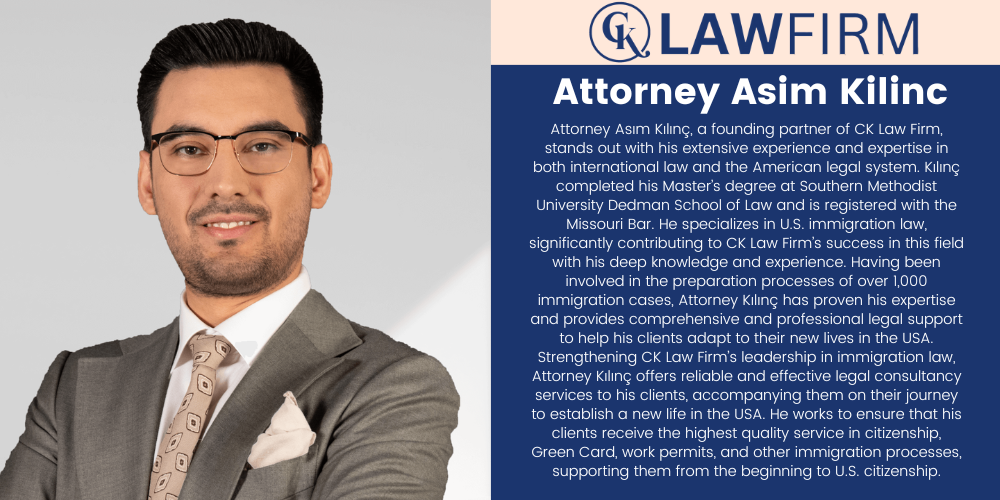
Asım Kılınç, Immigration Attorney, CK Law Firm
The E2 Investor Visa is one of the most popular options for foreign nationals who want to start a business or invest in the United States. This visa offers citizens of specific countries the opportunity to engage in commercial activities and establish a business in the U.S. With the E2 Investor Visa, it is possible to relocate to the U.S. and grow your business. However, there are certain E2 visa requirements and rules that must be followed during the application process. In this blog, we will cover the following topics:
- What is the E2 Investor Visa?
- Requirements for the U.S. E2 Investor Visa
- Rules for the U.S. E2 Visa
- How Much Investment is Needed for the E2 Visa?
- Living in the U.S. with an E2 Visa
- Is it Possible to Obtain a Green Card with an E2 Visa?
We provide detailed information on these topics. If you have any other questions or specific issues, you can always reach out to us via our website. You can also contact me directly on LinkedIn. Enjoy reading!
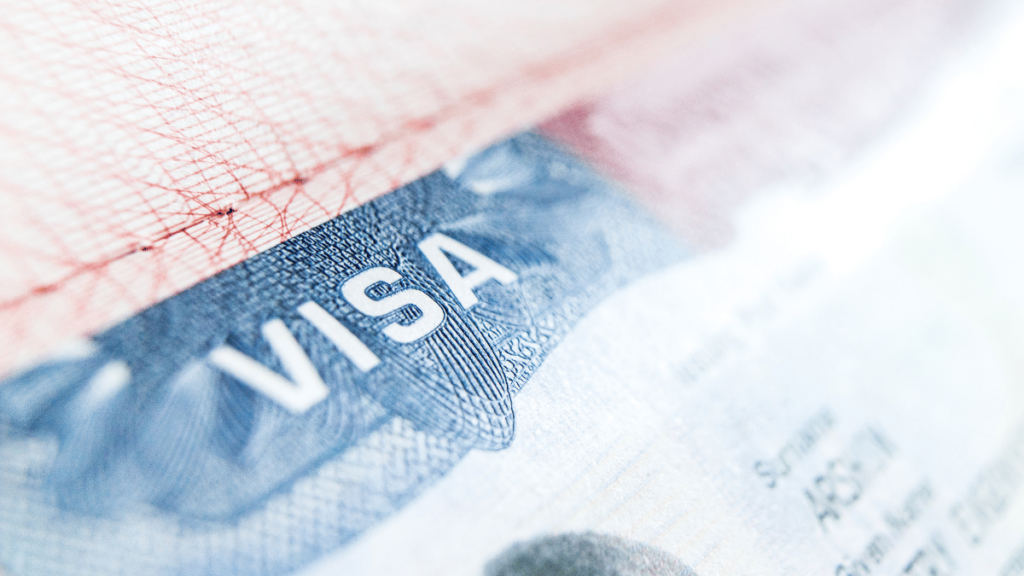
What is the E2 Investor Visa?
The U.S. E2 Investor Visa is a visa type that grants citizens of countries that have a trade and investment agreement with the U.S. the right to make a substantial investment and establish a business in the U.S. This visa is only available to applicants from designated countries, and there are specific conditions that must be met in order to apply.
Requirements for the U.S. E2 Investor Visa
To apply for the E2 visa, the following E2 visa conditions must be met:
- Nationality Requirement: The applicant must be a citizen of a country that has a trade agreement with the U.S.
- Investment Amount: The investment must be “substantial.” Typically, an investment between $100,000-$150,000 USD is recommended, although the amount can vary depending on the nature of the business.
- Active Business: The investment must involve an active commercial enterprise, not a passive income-generating activity. For example, opening a restaurant or store.
- Control Ownership: The applicant must have control over the business and own at least 50% of the company.
- Job Creation: The investment must contribute to the U.S. economy and have the potential to create jobs for U.S. citizens.
- Temporary Intent: While the applicant may plan to stay in the U.S. with an E2 visa, they must show the intention to return to their home country once the visa expires.
Rules for the U.S. E2 Visa
After obtaining the E2 investor visa, there are specific U.S. E2 investor visa rules that you must follow:
- Business Continuity: The business must remain operational, and the investment must be protected.
- Duration and Renewal: The E2 visa is typically valid for 2 to 5 years and can be renewed as long as the investment continues.
- Family Members: The spouse and children under 21 of the E2 visa holder can also live in the U.S. under the same visa, and spouses can apply for work authorization.
- Visa Purpose Compliance: The E2 visa only permits working at the invested business. Working for another employer is prohibited.
How Much Investment is Needed for the E2 Visa?
The required investment for the E2 visa application is not explicitly defined. However, the investment must be “substantial” and sufficient to sustain the business. Typically, an investment between $100,000 and $150,000 USD is advised. However, the amount can vary based on the type and size of the business.
- Small Businesses: For smaller businesses like a café or consulting firm, an investment of $100,000-$150,000 USD may be sufficient.
- Larger Businesses: For larger, capital-intensive businesses, the investment could exceed $300,000 USD.
The E2 visa investment amount must be large enough to ensure the business’s viability and contribute to the U.S. economy.

Living in the U.S. with an E2 Visa
The E2 Visa offers numerous opportunities for entrepreneurs to start a business and live in the U.S. The supportive business environment fosters innovation and offers access to global markets. The U.S. presents a particularly appealing destination for small and medium-sized enterprises (SMEs) due to its efficient market and global customer base. Additionally, living in the U.S. offers opportunities to experience cultural diversity and build a broad network in the business world.
Cost of living varies depending on the state and city chosen. Metropolises like New York and California have higher living costs, while states like Texas or Florida offer more affordable options. Entrepreneurs should be knowledgeable about tax regulations and business laws to manage their enterprises sustainably. Planning for essential needs like healthcare and education is also critical to enhancing the quality of life in the U.S.
Is it Possible to Obtain a Green Card with an E2 Visa?
Although this visa does not directly grant permanent residence, there are pathways to obtaining a Green Card:
- EB-5 Investor Program: By increasing your investment and investing at least $800,000 USD, you can apply for an EB-5 visa.
- Employer Sponsorship: After expanding your business to a certain level, you can apply for a Green Card through employer sponsorship.
- National Interest Waiver (NIW): If your economic contribution to the U.S. is significant, you may apply for a Green Card through the NIW program.
The U.S. E2 Investor Visa is an excellent opportunity for entrepreneurs who wish to start a business and engage in long-term commercial activities in the U.S. However, it is essential to adhere to the E2 investor visa requirements and rules during the application process, prepare all necessary documentation, and proceed with a sound strategy.
If you are looking to make a fresh start in the U.S. with the E2 visa and create opportunities as an investor, we have shared essential details about the process in this article. Successfully completing this process requires a proper strategy and professional preparation. CK Law Firm can guide you through this process. For more detailed information, you can contact us through our official website. If you have any questions, feel free to reach out to me directly via LinkedIn.
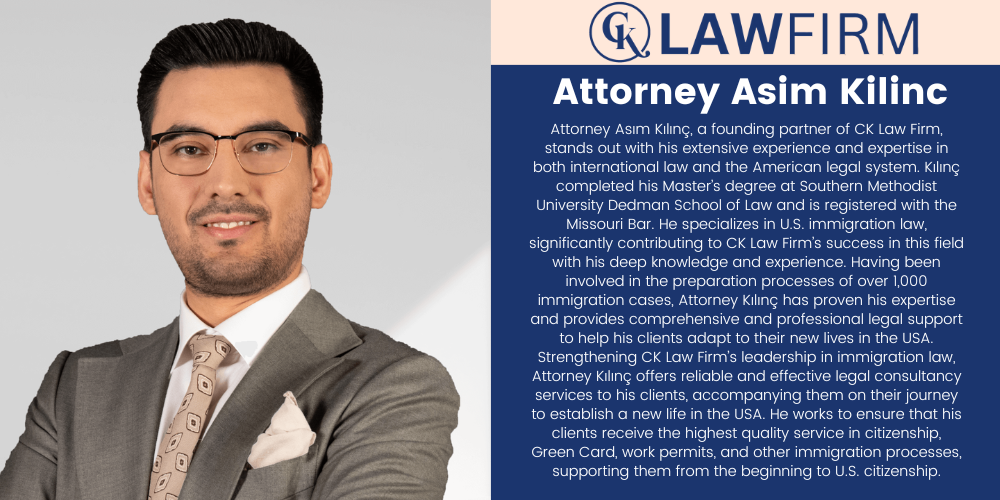
By Asim Kilinc, Immigration Attorney at CK Law Firm
The L1 visa is a special type of visa that allows international companies operating in the United States to temporarily transfer certain employees to the U.S. This visa is particularly suitable for individuals working in executive, managerial, or specialized knowledge positions. Applying for an L1 visa requires comprehensive document preparation. It is crucial to know what documents are needed to complete the application process smoothly. In this article, we will detail all the documents that must be prepared for the L1 visa application process:
- Passport: Validity and Other Requirements
- DS-160 Form: The Foundation of the Application Process
- Biometric Photograph: Specific Standards and Requirements
- Employer-Provided Documents: Assignment Letter and Company Information
- Work Experience and Educational Documents: Proof of Professional Background
- U.S. Accommodation Details: Lodging Arrangements
- Proof of Payment for the Application Fee: Financial Requirements
- Additional Documents: Other Documents That May Be Requested by the Consulate
If you have any other questions regarding the L1 visa type, please do not hesitate to contact me through the comments section below this article, directly via LinkedIn, or through the CK Law Firm Immigration Law Firm website, where I am a co-founder.
Passport: Validity and Other Requirements
Individuals applying for an L1 visa must have a passport that is valid for at least six more months from the date of entry into the United States. The condition of the passport is also crucial; worn or damaged passports may not be accepted. In addition to the current passport, any old passports should also be submitted if available, as they may be important for documenting the applicant’s travel history and previous visa issuances.
DS-160 Form: The Foundation of the Application Process
The DS-160 form is an online form that must be completed by anyone applying for a U.S. visa. This form includes the applicant’s personal information, purpose of travel, plans in the U.S., and visa history. It is critical that the form is filled out completely and accurately, as it plays a key role in the success of the application process. Once the DS-160 form is completed, the confirmation page should be printed out and presented during the visa interview. The information provided in the form must be consistent with other documents submitted during the application process.
Biometric Photograph: Specific Standards and Requirements
A biometric photo that meets specific standards is required for the L1 visa application. The photo must adhere to the following specifications:
- Size: The photo must be 5×5 cm.
- Background: The background of the photo must be white.
- Recency: The photo must have been taken within the last six months.
- Facial Expression: The photo should feature a neutral facial expression, and the entire face must be visible.
A digital copy of this photo should be uploaded online with the DS-160 form, and a printed copy must be presented during the visa interview.
Employer-Provided Documents: Assignment Letter and Company Information
The individual applying for the L1 visa must obtain certain documents from their employer. These documents are a critical part of the application because they prove to U.S. authorities that the applicant is truly eligible for the L1 visa. The required documents typically include:
Assignment Letter: This document should clearly state that the applicant will be working at a U.S. office and specify the position they will hold. Additionally, it should explain the significance of this position within the company and why the applicant was chosen for this role. The letter is usually signed by a senior executive of the company.
Company Activity Documents: Documents proving that the applicant’s employer is operating both in the U.S. and internationally must be submitted. These documents should demonstrate that the company is legally operational, has a physical office in the U.S., and that this office is active.
Company Tax Documents: Documents showing that the company operating in the U.S. has regularly paid its taxes should also be included in the application file. These documents prove that the company is financially sound and legally established.
Work Experience and Educational Documents: Proof of Professional Background
The individual applying for the L1 visa must submit documents proving that they have worked for at least one year within the last three years before the application date. These documents should demonstrate that the applicant has the necessary qualifications for the position:
Work Certificate: This document, issued by the company’s human resources department, should state how long the applicant has worked at the company, the positions they have held, and the responsibilities they have taken on. This document is a crucial piece of evidence showing that the applicant is eligible for the L1 visa.
Diplomas and Certificates: The applicant’s educational qualifications and professional certifications must also be submitted. These documents demonstrate the applicant’s expertise and competence in their field. It is especially important for technical positions that these documents are complete and detailed.
U.S. Accommodation Details: Lodging Arrangements
The applicant must provide information about where they will stay in the U.S. This could be a hotel reservation, a rental agreement, or an invitation letter from a host in the U.S. Lodging arrangements are an important detail that shows the applicant will reside in the U.S. legally and properly.
Proof of Payment for the Application Fee: Financial Requirements
A specific fee must be paid when applying for the L1 visa. This fee is an official part of the application process, and proof of payment must be included in the application documents. If the fee is not paid, the application process cannot be completed, and the application may be denied. Therefore, it is crucial to ensure that the fee is paid in full and on time.
Additional Documents: Other Documents That May Be Requested by the Consulate
During the application process, consulate officials may request additional documents. For example, bank statements to provide information about the applicant’s financial situation, sponsor letters provided by the U.S. employer, or documents specifying how long the applicant will stay in the U.S. may be requested. These documents help prove that the applicant will legally reside and work in the U.S.
Conclusion
The L1 visa application process requires careful preparation and detailed document submission. It is essential that the documents are complete, accurate, and consistent to successfully complete the application process. Given the complexity of the process and legal requirements, it may be helpful to seek support from an immigration lawyer. Remember, you can reach out to me directly via LinkedIn, or through the CK Law Firm Immigration Law Firm website at info@cklawfirm.org.
Who is Attorney Asım Kılınç?
Attorney Asım Kılınç is the co-founder of CK Law Firm and is recognized for his expertise in immigration law and U.S. asylum applications. Kılınç completed his Master’s degree at Southern Methodist University Dedman School of Law and is a member of the Missouri Bar Association, with a focus on U.S. immigration law.
Attorney Kılınç’s extensive knowledge and experience in immigration law have significantly contributed to CK Law Firm’s success in this field. He has actively participated in the preparation of over 1,000 cases, demonstrating his expertise in this area. By providing comprehensive and professional legal support to his clients, he helps them adapt to their new lives in the U.S.
Attorney Kılınç is also well-versed in U.S. asylum applications. He meticulously guides his clients through the process and ensures they receive the best legal advice. He provides top-quality service to clients in matters of citizenship, Green Card, work permits, and other immigration processes, supporting them from start to finish on their journey to U.S. citizenship.
Attorney Asım Kılınç, who solidifies CK Law Firm’s leadership in immigration law and U.S. asylum applications, offers reliable and effective legal consultancy services to clients, assisting them in building a new life in the U.S.
By Ergul Celiksoy, Immigration Attorney at CK Law Firm
The H-1B visa is a gateway to opportunities for Turkish professionals aiming to build a career in the United States. However, there are specific considerations Turkish experts should keep in mind during this process. In this article, I will share insights into which occupations qualify for this visa and which are most quickly approved. Here are the topics I’ll be covering to help you successfully navigate your application:
- H-1B Visa: Your Key to Working in the U.S.
- Jobs You Can Work with an H-1B Visa
- H-1B Visa Basic Fees
- Working in the U.S. with an H-1B Visa: Advantages
I’ll address the above topics in detail, but if you have additional questions, feel free to ask in the comments section of this blog or reach out via our website. For inquiries on other topics, you can also connect with me directly on LinkedIn.
H-1B Visa: Your Key to Working in the U.S.
The H1B visa provides temporary work authorization for foreign professionals seeking employment in specialized fields in the United States. While it is most commonly associated with STEM fields (Science, Technology, Engineering, and Mathematics), it also offers opportunities in other sectors such as healthcare, finance, and academia.
How Long is the H-1B Visa Valid?
The question of how long the H-1B visa is valid is an important one, as it helps determine how long you can continue your career in the United States. Initially, the H-1B visa is issued for a period of three years. However, it can be extended up to six years when necessary. Additionally, you have the opportunity to transition your H-1B visa to a Green Card with the help of your sponsor, granting you permanent residency in the U.S.
Jobs You Can Work with an H-1B Visa
Knowing which professions qualify for the H-1B visa is crucial for navigating the application process effectively. Here are some of the key H-1B visa jobs:
1. Technology and Software Industry
One of the most in-demand fields in the U.S. is the technology sector. Key professions in this industry include:
- Software Engineer
- Data Scientist
- Artificial Intelligence Specialist
- Cybersecurity Analyst
Tech giants like Google, Amazon, and Microsoft hire thousands of professionals in technology-related fields annually through the H-1B visa program. For experts in these areas, building strong connections with these companies can significantly streamline the application process.
2. Engineering Fields
The demand for engineering professionals in the U.S. has grown due to infrastructure projects and industrial development. This provides opportunities for experts in engineering to apply for the H-1B visa. Key specialties in this field include:
- Chemical Engineer
- Electrical Engineer
- Mechanical Engineer
- Civil Engineer
3. Healthcare
The healthcare sector is one of the most critical industries in the U.S., as it is globally. This creates opportunities for healthcare professionals to apply for the H-1B visa. Key roles in this sector include:
- Doctors
- Nurses
- Biomedical Researchers
- Medical Technology Specialists
4. Finance and Business
International companies in the U.S. place significant value on skilled professionals in finance and business. Experts in these fields can secure opportunities to work in the U.S. through the H-1B visa. Prominent roles in this sector include:
- Financial Analyst
- Accounting Specialist
- Business Strategist
- Project Manager
5. Academic Fields
The U.S. is a global hub for academic and research projects, offering significant opportunities to professionals in these areas through the H-1B visa. Individuals with the following titles are particularly sought after:
- University Professors
- Research Assistants
- Academic Advisors
Which Professions Get Approved Faster?
Certain H-1B visa occupations are prioritized and receive approvals more quickly. Here are the professions and the reasons they often experience expedited processing:
- Software Developers and Data Scientists: The technology sector leads in H-1B visa approvals due to high demand.
- Healthcare Professionals: Doctors and nurses are prioritized because of the critical healthcare needs in the U.S.
- Engineers: Electrical and civil engineers often have high approval rates due to their vital role in infrastructure and development projects.
- Researchers: Professionals working in universities and private research institutions frequently benefit from expedited processing due to their contributions to academia and innovation.
H-1B Visa Basic Fees
The H-1B visa fees are primarily the responsibility of the employer. While applicants are expected to cover personal expenses, the official procedural costs are borne by the sponsoring employer. These costs include:
- Application Fee: $460
- Anti-Fraud Fee: $500
- Education and Workforce Fee: $750–$1,500 (varies based on employer size)
- Premium Processing Fee: $2,500 (optional for expedited processing)
Employers are legally prohibited from passing these costs onto the employee. Regulations clearly state that sponsors must cover these expenses. For a more detailed breakdown of H-1B visa cost, refer to our article, “How Much Does H-1B Visa Cost? (Detailed Pricing).”
Working in the U.S. with an H-1B Visa: Advantages
Holding an H-1B visa offers several benefits for professionals working in the United States, including:
- International Career Opportunities: Access to unparalleled opportunities in the global job market of the U.S.
- Family Accompaniment: H-1B visa holders can have their spouses and children join them in the U.S. under the H-4 visa.
- Professional Development: Extensive opportunities for academic and career growth.
The advantages of the H-1B visa go beyond these. It also allows you to apply for a Green Card. With employer support, you can begin the process to secure permanent residency while working legally in the U.S. Once you obtain a Green Card, you gain permanent residency and the ability to apply for U.S. citizenship.
In this article, I have explored key professions eligible for the H-1B visa. If you have any questions about this topic, feel free to leave a comment on this blog or contact us through the official CK Law Firm website. For discussions on specific topics, you can also reach out to me directly on LinkedIn.
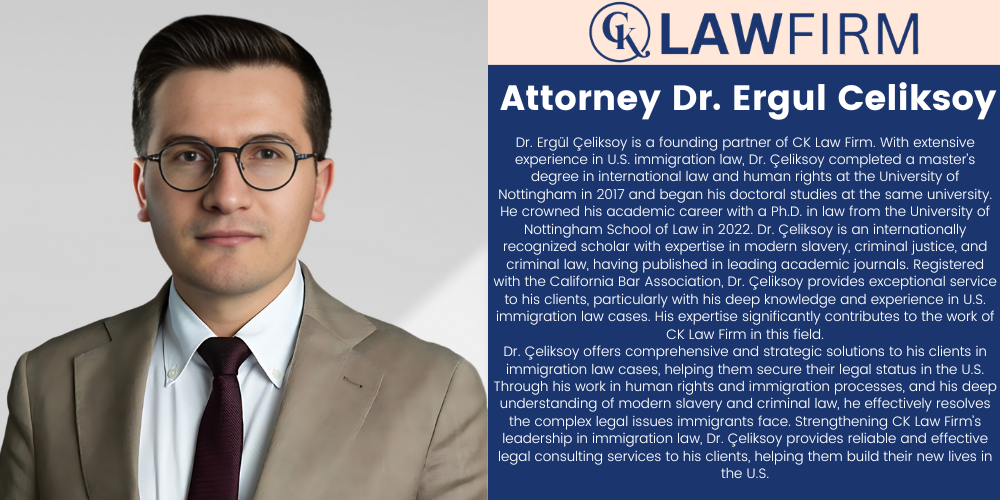
Subscribe to Our Newsletter
Subscribe to our newsletter to stay informed about the latest announcements and articles written by our attorneys on U.S. immigration processes.
Sobre Nosotros
Contáctanos
+1 (945) 527- 23 22
Correo electrónico
info@cklawfirm.org
Dirección
2800 Regal Rd #102, Plano, TX 75075

All Rights Reserved by CK Law Firm.


